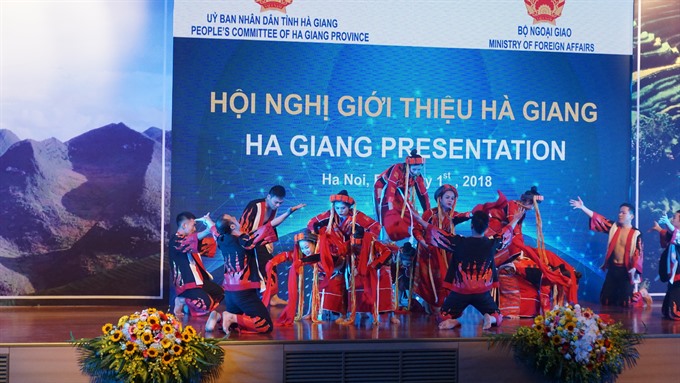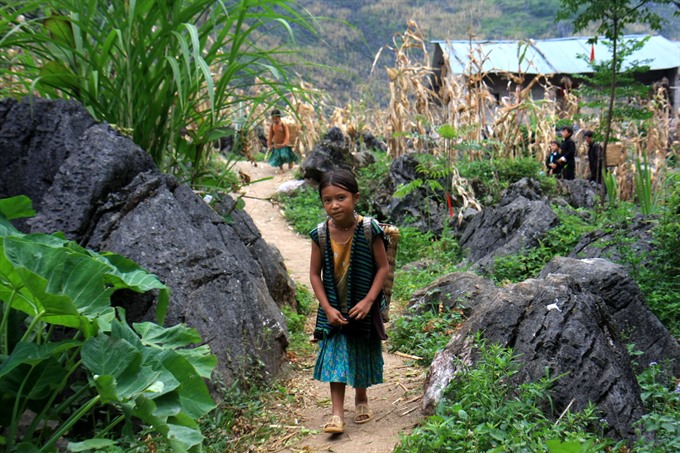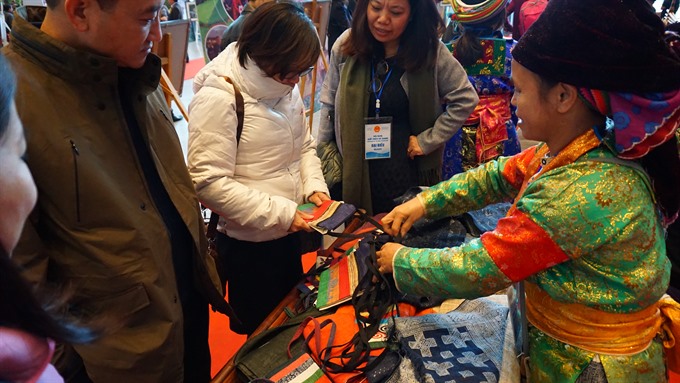 Society
Society

Hà Giang Province has been advised to continue pursuing sustainable development, with a focus on tourism, one of the biggest potentials of the northernmost region.
 |
| Ancient: A ritual fire dance performance by Hà Giang people was presented at February 1 conference. — VNS Photo Trọng Kiên |
HÀ NỘI — Hà Giang Province has been advised to continue pursuing sustainable development, with a focus on tourism, one of the biggest potentials of the northernmost region.
The recommendation was made by international partners and organisations participating in a conference held on February 1 in Hà Nội by the Ministry of Foreign Affairs in a bid to introduce the potentials of the ’beautiful and unspoiled’ province to the world.
Michael Croft, head of office and UNESCO country representative to Việt Nam, praised Hà Giang as being a model of sustainable development as it continues to develop sustainable tourism, conserve local heritage and promote earth science research in the Đồng Văn Karst Plateau, recognised by UNESCO as a Global Geopark.
 |
| Unspoiled beauty: An ethnic minority girl living on the Đồng Văn Karst Plateau in the northernmost province of Hà Giang. — VNA/VNS Photo Nhật Anh |
Irish Ambassador to Việt Nam, Cáit Moran, shared a similar sentiment, saying, however, that the special nature of the province’s tourism lay in its small-scale characteristics, eco-tourism, and community tourism.
She said after her trip to the province, she had come to appreciate the real value of diversity in the region and advise the provincial authorities to craft policies and decisions that “respect and engage these small communities”.
Developing tourism but preserving ethnic diversity and culture has been identified as one of the areas needing support from international partners, according to Nguyễn Văn Sơn, chairman of Hà Giang Province’s People’s Committee.
 |
| Hà Giang locals presented their craft products to guests in February 1 conference to help promote the images of Hà Giang to international partners. — VNS Photo Trọng Kiên |
The second priority was to develop and transfer high-quality plant varieties, with a focus on organic agriculture and promoting the capacity of manpower and agriculture officials and technicians.
Sơn said Hà Giang had 8,000ha of king oranges, whose unique flavour earned Ministry of Industry and Trade’s geographical indication and made it a name across the country. Thirty per cent of orange orchards and plantations of shan tuyết tea is being cultivated following VietGap standards and the province wants to expand the VietGAP-compliant areas.
 |
| Hà Giang Province Fact sheet. — VNA/VNS Infographic Trọng Kiên |
At the conference, Hà Giang Province’s Party Secretary Triệu Tài Vinh asked the European Chamber of Commerce in Việt Nam (Eurocham), whose presence remains limited in the province, to help Hà Giang step up from VietGap to Global GAP, making its agro-products better known internationally and able to enter more demanding markets such as the EU.
He said Hà Giang’s third priority area was in attracting official development aid and preferential-interest loans to implement a range of infrastructure development projects, including water supplies, wastewater treatment, upgrading health and education facilities, and building safer roads.
The province also attaches importance to improving human resources as well as scientific and technological capabilities, creating jobs, poverty alleviation, and ensuring the rights of workers and disadvantaged groups in the locality.
Reaffirming the province’s commitments in administrative reforms, he said the province had implemented many measures to streamline them under the one-stop mechanism, to best facilitate the conditions for businesses and organisations, Secretary Vinh said.
The “Hà Giang Presentation” conference kicked off of a series of programmes to help promote the images, strengths and potentials of localities across Việt Nam to international organisations, diplomatic missions, and foreign businesses.
Deputy Minister of Foreign Affairs Bùi Thanh Sơn noted Hà Giang was selected as the first due to “its converging of tangible and intangible values,” and for its huge untapped potential. — VNS




